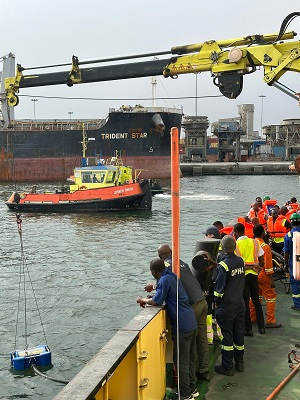Officials from Ghana’s maritime sector agencies are undergoing training in the various stages of the national oil contingency plan to prepare them for any unfortunate incidents in future.
As part of a four-day training program, these officials have visited the Port of Tema to acquire first-hand experience of the appropriate use of oil spill apparatus.
The exercise was organised by the Environmental Protection Agency (EPA) and the Ghana Ports and Harbours Authority and facilitated by experts from Norwegian maritime and environmental firm, NovuMare.
The Director in charge of Petroleum at the Environmental Protection Agency (EPA) Kojo Agbenor-Efunam, explained that practical training in such an operational area was necessary for the contingency plan.
He explained that the practical experience helped them understand that time is a key factor in mobilization during oil spills.
“For example we came here in the morning but it is evening now so that tells you that even you can have the equipment but mobilization also takes a lot of time so the time factor is also important for our training to let the participants understand that it is not only having the resources that is important but then you must also input the time.”
An Emergency Preparedness Advisor at NovuMare, Sveinung Nymark highlighted the significance of continuous training at the operational level to maintain momentum.
“I can say with certainty if the workers or the operators do what they now have shown us, I can say for certain yes you are capable. What we know from experience is that if you do it once and never again you will forget it so my recommendation will be to practice have exercises from time to time to keep the knowledge at hand,” the Norwegian advised.
The On-Scene Commander and Deputy Harbour Master, Logistics at GPHA, Captain Daniel Quartey on his part said GPHA is keen on continuous training to stay prepared ahead of unforeseen circumstances.
Oil spills are among common maritime incidents that require maximum collaborative efforts to prevent and curtail, due to dire environmental and financial implications that arise from them.
This is why Ghana has since 1986 sought the help of the International Maritime Organisation in developing an oil spill contingency plan. Contingency plans however are kept alive by constant training and exercises.
